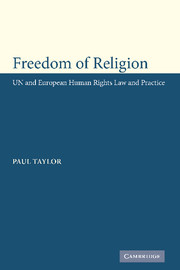Book contents
- Frontmatter
- Contents
- Foreword by David Harris
- Preface
- Table of cases, applications, and communications
- Table of treaties, declarations, and other international instruments
- List of abbreviations
- 1 Introduction
- 2 Freedom of religious choice
- 3 The scope of the forum internum beyond religious choice
- 4 The right to manifest religious belief and applicable limitations
- 5 Conclusion
- Annexes
- Bibliography
- Index
1 - Introduction
Published online by Cambridge University Press: 14 January 2010
- Frontmatter
- Contents
- Foreword by David Harris
- Preface
- Table of cases, applications, and communications
- Table of treaties, declarations, and other international instruments
- List of abbreviations
- 1 Introduction
- 2 Freedom of religious choice
- 3 The scope of the forum internum beyond religious choice
- 4 The right to manifest religious belief and applicable limitations
- 5 Conclusion
- Annexes
- Bibliography
- Index
Summary
Overview
An appraisal of the development and content of the freedom of thought, conscience and religion has never been more challenging. Events since the collapse of the former Soviet Union and the aftermath of the attacks of 11 September 2001 have confronted the traditional concept of freedom of religion with an entirely new range of demands. These could not have been anticipated by the drafters of the core freedom of religion Articles in the foundational instruments. In the United Nations context these are Article 18 of the Universal Declaration on Human Rights (the ‘Universal Declaration’) and Article 18 of the International Covenant on Civil and Political Rights (‘the ICCPR’). Within the Convention for the Protection of Human Rights and Fundamental Freedoms (‘the European Convention’), adopted under the auspices of the Council of Europe, the key provision is Article 9. Even the Declaration on the Elimination of all Forms of Intolerance and of Discrimination Based on Religion or Belief (‘the 1981 Declaration’), which was concluded much later and was the first international instrument dedicated solely to freedom of religion, did not contemplate recent patterns of violation which are emerging globally.
Those texts constitute the basic building blocks of the freedom of religion and were inevitably shaped by the issues which faced the original drafters. Prominent areas of contention in the early debates were resistance to an explicit right to change religion (from various Islamic countries), doubts about proselytism as an adjunct to the right to practise a religion and, more generally, the ideological opposition from numerous Communist countries to the assertion of rights of the individual over the interests of the State.
- Type
- Chapter
- Information
- Freedom of ReligionUN and European Human Rights Law and Practice, pp. 1 - 23Publisher: Cambridge University PressPrint publication year: 2005



